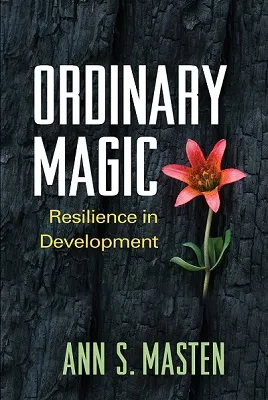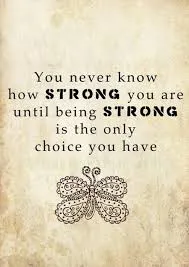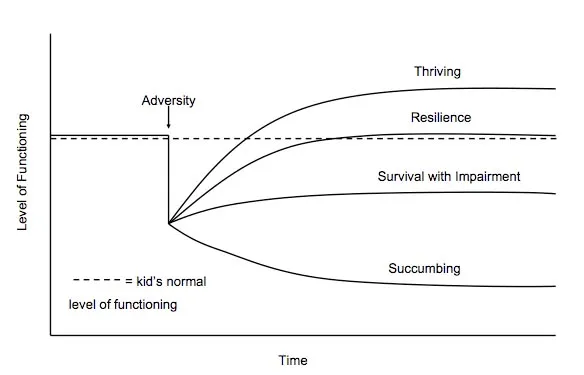Harnessing the 'magic' of resilience in championing adversity for supercharged lives
Earlier this month YourStory founder Shradha Sharma delivered a wildly popular Ted talk at San Francisco. It was raw, honest and searing, one where she opened up about life’s deepest pains and scars and reflected how that pain had been the foundation on which she built her most worthwhile achievements. She referred to writer Mary Oliver’s beautiful words, “Someone I loved once gave me a box full of darkness. It took me years to understand that this too, was a gift,” to illustrate how adversity can transform us from ordinary to extraordinary beings and why this is the only superpower we need to live enriched and productive lives.

This is not a novel thought. Humanity’s greatest minds, over centuries, have echoed how adversity is the path to hone our strengths, magnify our achievements, acquire meaning and purpose in life and become the best version of ourselves. Edgar Allan Poe said, “Never to suffer would never to have been blessed.” Charles Bukowski said, “Those having nothing to struggle against, they have nothing to struggle for.” Mary Tyler Moore said, “You can't be brave if you've only had wonderful things happen to you.” Rose Kennedy said, “Prosperity tries the fortunate, adversity the great.” And lastly Napoleon Hill said, “Every adversity, every failure, every heartache carries with it the seed of an equal or greater benefit.”
Adversity as the precursor to great success may not be a novel thought, but in this age of hero worshiping overnight successes, glorifying dropout millionaires, the sea of self-help books and culture of instant gratification, there is little time or patience to pay heed to this undervalued gem. Even for those of us who value and believe in the healing powers of adversity, the actual act of overcoming odds and obstacles and enduring the pain of failure while holding onto hope remains gut-wrenchingly hard. Inspiration can only be stretched this much. To face adversity head on- to face challenges with burning optimism and not just in survival mode, to not just be intimidated by what lies before us but to jump into it with fervour and fight it with resounding might- that is an attitude that doesn't simply exist within us. It has to be consciously cultivated, nurtured and strengthened. That attitude has a name- resilience.
The dictionary meaning of resilience refers to the ability of an object to return to original form after being bent, beaten, stretched or compressed out of shape. But for human beings, living resiliently is more than just bouncing back. It is, in the words of psychologist Linda Klau “About shifting our perceptions, changing our responses, and learning something new.” In psychology, resilience is defined as a positive adaptation after a stressful situation. But my favourite definition is the one coined by psychologist Ann Masten, who calls it, ‘Ordinary magic.’

Masten, a pioneering figure in the world of resilience research, was an army kid who spent much of her childhood moving about the country. This fostered a sense of rootlessness which directs much of her research energies today: “As a kid, I moved around a lot. It is probably not a coincidence that I now do research on refugees, immigrants, homeless, highly mobile families. A lot of my work has focused on people who are moving around and need to adapt, whether they are migrating for positive reasons or they’re fleeing from war zones or disasters.” Of her work with people who have faced severe trauma, be it refugees fleeing war zones, little children growing up homeless or abused and tormented substance addicts, Masten says, “Resilience is common and it typically arises from the operation of normal rather than extraordinary human capabilities, relationships, and resources. In other words, resilience emerges from ordinary magic.”
Developing resilience is not just for the hard times. Klau says, “Living resiliently represents a whole new way of being and doing. In this way, resilience isn't just for the hard times. It's for all times. Empowering us to live, love, and work adventurously in the face of change, it builds a well from which we can draw for the rest of our lives.” With this sentiment Klau echoes Greek stoic philosopher Epitectus who said, “People are not afraid of things, but of how they view them.”

Like all worthwhile human qualities, resilience can be developed by anyone at any time. It requires a combination of individual resources and actively nurtured core qualities. The foundations of resilience include psychological resources such as a flexible self-concept that permits people to change key features of their self-definition in response to changing circumstances, a sense of autonomy and self-direction and environmental mastery and competence. A personality that can easily adapt to change, a strong sense of optimism and a positive self-image are irreplaceable. The ability to regulate and control emotions and impulses is equally important. Lastly, a sense of humour will get you through the worst of them.The accompanying set of core qualities that need to be cultivated, according to positive psychologist Barbara Frederickson, are thus. The most crucial one is mindfulness- to be active and engaged in one’s present, rather than being a passive witness to the vagaries of life. Like its cousin authenticity, mindfulness is an obvious way of being, yet one that is infinitely harder to embrace. If you’ve got the mindfulness figured out, the rest will be a cakewalk (well not quite, but almost).
Carrying on with Frederickson’s qualities that rear resilience, the first is compassion. When you are kind, supportive and not judgemental then, “If mindfulness brings the wisdom to see clearly, then compassion brings a loving heart” (Neff, 2011). Next is acceptance. Clear objective acceptance brings with it the clarity to view facts as they are and not be swayed by emotions. As Klau puts it, “Acceptance isn't about ‘giving up’. It is having the strength to ‘let go’ of control and stop fighting reality.”

Openness is penultimate on the list, “You're progressively open to viewing even the most difficult situations as opportunities for growth. You trust that they have something to teach you, and you expect to learn.” And lastly it is creativity. Writer Erica Jong said, “Everyone has talent. What's rare is the courage to follow it to the dark places where it leads.” When you give free reign to your creativity, it is not so with the intention or expectation of success. Harnessing your creativity is giving your mind free reign to probe every inch of your spirit. Mine your soul for all you are worth. It is, as Klau puts it, “Drawing on your power to visualize and create the results you desire. At the same time, in the spirit of acceptance, you are not attached or fixated upon your own expectations.”
Masten writes, “Ancient tales suggest that as long as humans have told stories, they have been intrigued with people who overcome adversity to succeed in life.” It is the same for us today, what with our obsession with superhero comics and movies. Adversity is as old as humanity. It is what has kept us, as a species, not just surviving but also thriving. It is what will take mankind to the next level. It is what will distinguish your life from being an ordinary one to being a great one. With the superpower of adversity and the (ordinary) magic of resilience, go and conquer the world.







